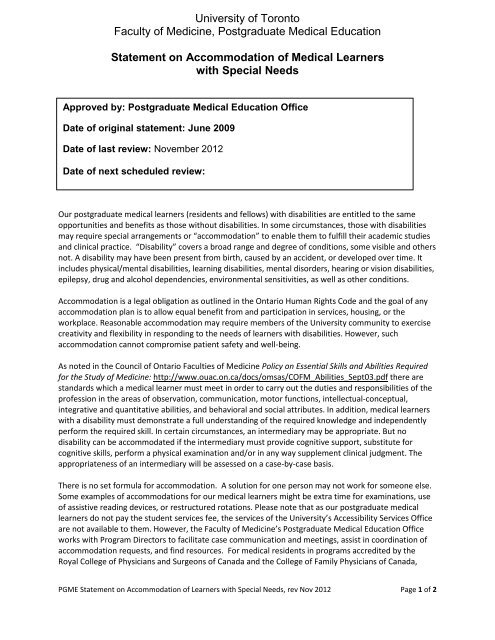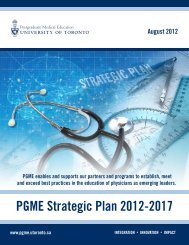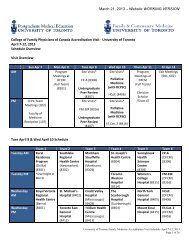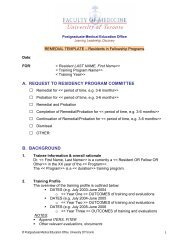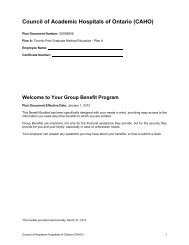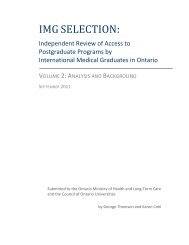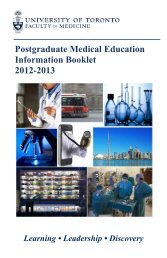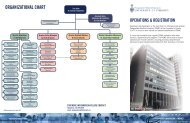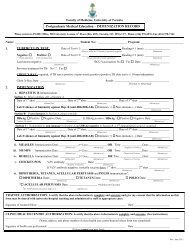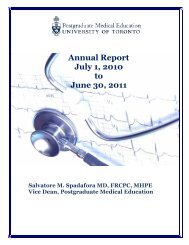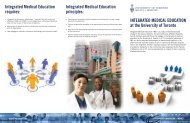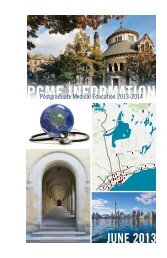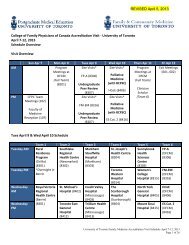Statement on Accommodation of Medical Learners with Special ...
Statement on Accommodation of Medical Learners with Special ...
Statement on Accommodation of Medical Learners with Special ...
Create successful ePaper yourself
Turn your PDF publications into a flip-book with our unique Google optimized e-Paper software.
University <strong>of</strong> Tor<strong>on</strong>to<br />
Faculty <strong>of</strong> Medicine, Postgraduate <strong>Medical</strong> Educati<strong>on</strong><br />
<str<strong>on</strong>g>Statement</str<strong>on</strong>g> <strong>on</strong> Accommodati<strong>on</strong> <strong>of</strong> <strong>Medical</strong> <strong>Learners</strong><br />
<strong>with</strong> <strong>Special</strong> Needs<br />
Approved by: Postgraduate <strong>Medical</strong> Educati<strong>on</strong> Office<br />
Date <strong>of</strong> original statement: June 2009<br />
Date <strong>of</strong> last review: November 2012<br />
Date <strong>of</strong> next scheduled review:<br />
Our postgraduate medical learners (residents and fellows) <strong>with</strong> disabilities are entitled to the same<br />
opportunities and benefits as those <strong>with</strong>out disabilities. In some circumstances, those <strong>with</strong> disabilities<br />
may require special arrangements or “accommodati<strong>on</strong>” to enable them to fulfill their academic studies<br />
and clinical practice. “Disability” covers a broad range and degree <strong>of</strong> c<strong>on</strong>diti<strong>on</strong>s, some visible and others<br />
not. A disability may have been present from birth, caused by an accident, or developed over time. It<br />
includes physical/mental disabilities, learning disabilities, mental disorders, hearing or visi<strong>on</strong> disabilities,<br />
epilepsy, drug and alcohol dependencies, envir<strong>on</strong>mental sensitivities, as well as other c<strong>on</strong>diti<strong>on</strong>s.<br />
Accommodati<strong>on</strong> is a legal obligati<strong>on</strong> as outlined in the Ontario Human Rights Code and the goal <strong>of</strong> any<br />
accommodati<strong>on</strong> plan is to allow equal benefit from and participati<strong>on</strong> in services, housing, or the<br />
workplace. Reas<strong>on</strong>able accommodati<strong>on</strong> may require members <strong>of</strong> the University community to exercise<br />
creativity and flexibility in resp<strong>on</strong>ding to the needs <strong>of</strong> learners <strong>with</strong> disabilities. However, such<br />
accommodati<strong>on</strong> cannot compromise patient safety and well-being.<br />
As noted in the Council <strong>of</strong> Ontario Faculties <strong>of</strong> Medicine Policy <strong>on</strong> Essential Skills and Abilities Required<br />
for the Study <strong>of</strong> Medicine: http://www.ouac.<strong>on</strong>.ca/docs/omsas/COFM_Abilities_Sept03.pdf there are<br />
standards which a medical learner must meet in order to carry out the duties and resp<strong>on</strong>sibilities <strong>of</strong> the<br />
pr<strong>of</strong>essi<strong>on</strong> in the areas <strong>of</strong> observati<strong>on</strong>, communicati<strong>on</strong>, motor functi<strong>on</strong>s, intellectual-c<strong>on</strong>ceptual,<br />
integrative and quantitative abilities, and behavioral and social attributes. In additi<strong>on</strong>, medical learners<br />
<strong>with</strong> a disability must dem<strong>on</strong>strate a full understanding <strong>of</strong> the required knowledge and independently<br />
perform the required skill. In certain circumstances, an intermediary may be appropriate. But no<br />
disability can be accommodated if the intermediary must provide cognitive support, substitute for<br />
cognitive skills, perform a physical examinati<strong>on</strong> and/or in any way supplement clinical judgment. The<br />
appropriateness <strong>of</strong> an intermediary will be assessed <strong>on</strong> a case-by-case basis.<br />
There is no set formula for accommodati<strong>on</strong>. A soluti<strong>on</strong> for <strong>on</strong>e pers<strong>on</strong> may not work for some<strong>on</strong>e else.<br />
Some examples <strong>of</strong> accommodati<strong>on</strong>s for our medical learners might be extra time for examinati<strong>on</strong>s, use<br />
<strong>of</strong> assistive reading devices, or restructured rotati<strong>on</strong>s. Please note that as our postgraduate medical<br />
learners do not pay the student services fee, the services <strong>of</strong> the University’s Accessibility Services Office<br />
are not available to them. However, the Faculty <strong>of</strong> Medicine’s Postgraduate <strong>Medical</strong> Educati<strong>on</strong> Office<br />
works <strong>with</strong> Program Directors to facilitate case communicati<strong>on</strong> and meetings, assist in coordinati<strong>on</strong> <strong>of</strong><br />
accommodati<strong>on</strong> requests, and find resources. For medical residents in programs accredited by the<br />
Royal College <strong>of</strong> Physicians and Surge<strong>on</strong>s <strong>of</strong> Canada and the College <strong>of</strong> Family Physicians <strong>of</strong> Canada,<br />
PGME <str<strong>on</strong>g>Statement</str<strong>on</strong>g> <strong>on</strong> Accommodati<strong>on</strong> <strong>of</strong> <strong>Learners</strong> <strong>with</strong> <strong>Special</strong> Needs, rev Nov 2012 Page 1 <strong>of</strong> 2
extra care must be taken in formulating an accommodati<strong>on</strong> plan to ensure the specialty training<br />
requirements for certificati<strong>on</strong> are met.<br />
Accommodati<strong>on</strong> is a shared resp<strong>on</strong>sibility. Every<strong>on</strong>e involved, including the medical trainee, should cooperate<br />
in the process, exchange relevant informati<strong>on</strong>, and explore accommodati<strong>on</strong> soluti<strong>on</strong>s together.<br />
Accommodati<strong>on</strong> for trainees who have been identified <strong>with</strong> a communicable disease are reviewed by<br />
the Faculty’s Expert Panel <strong>on</strong> Infecti<strong>on</strong> C<strong>on</strong>trol. The Panel reviews the procedures the trainee will<br />
perform according the Level <strong>of</strong> risk for bloodborne pathogen transmissi<strong>on</strong> as outlined in the Society for<br />
Healthcare Epidemiology <strong>of</strong> America (SHEA) Guideline for Management <strong>of</strong> Healthcare Workers Who Are<br />
Infected <strong>with</strong> Hepatitis B Virus, Hepatitis C Virus, and/or Human Immunodeficiency Virus, March 2010.<br />
Program Directors are involved in the Panel’s discussi<strong>on</strong> <strong>of</strong> rotati<strong>on</strong> service and call modificati<strong>on</strong><br />
required to accommodate.<br />
Self-protecti<strong>on</strong> procedures are reviewed <strong>with</strong> the trainee by the Chair <strong>of</strong> the Panel, a c<strong>on</strong>tract is signed<br />
outlining the trainee’s requirements and commitment to a hepatologist follow-up and report plan. The<br />
Program Director is resp<strong>on</strong>sible for informing the relevant hospital/faculty members <strong>on</strong> a need-to-know<br />
basis regarding rotati<strong>on</strong> and/or call modificati<strong>on</strong>. The Postgraduate <strong>Medical</strong> Educati<strong>on</strong> Office is<br />
resp<strong>on</strong>sible for tracking submissi<strong>on</strong> <strong>of</strong> the trainee’s follow-up reports.<br />
PGME <str<strong>on</strong>g>Statement</str<strong>on</strong>g> <strong>on</strong> Accommodati<strong>on</strong> <strong>of</strong> <strong>Learners</strong> <strong>with</strong> <strong>Special</strong> Needs, rev Nov 2012 Page 2 <strong>of</strong> 2


